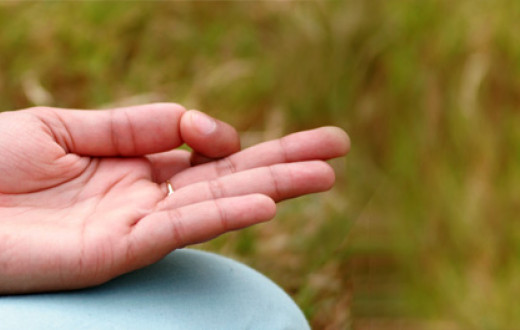"Dukha dourmanasyangamejayatva shwasaprashwasa vikshepasahabhuvaha''
dukha = sorrow; dourmansya = bitterness; angamejayatva = body not listening to you; shwasa = inspiration; prashwasa = expiration; vikshepa = distracton; sahabhuvaha = companions
"Sorrow, bitterness, body not listening to you, shaky and irregular inspiration and expiration are the companions of these distractions."
- Patanjali Yoga Sutra #31
We saw the nine types of obstacles in the previous Patanjali Yoga Sutra posts. We considered the nine possible obstacles in the path of yoga. There is no tenth obstacle. Every obstacle, every possible obstacle has been counted, included in these nine categories. Patanjali is such a scientist. In just a few words, very concisely he has said all that has to be said and that is needed to be said.
What comes along with these obstacles?
Along with these nine obstacles, the five indications or signs of a disturbed mind are mentioned. That is:
Dukha – sorrow, sadness
Dourmanasya - bitterness in the mind. You feel bitter inside. You do not feel good with anybody. Anyone you see or meet, there is bitterness. There is bitterness with one self.
Angamejayatva - restlessness in the body or lack of co-ordination between the body and the mind. Angamejayatva means the body is not listening to you. Like a drunkard. A man, who is drunk, the one who has drunk too much wants to go to left but he starts moving to the right. His body takes him to the right. He wants to walk straight but his body goes haphazard. He tries to grab the glass and he goes on putting his hand on the table away from the glass, trying to hold the glass. Lack of co-ordination between the body and the mind. The body wins over. The body does not listen to you. You want to walk but the body is not getting up.
Shwāsa prashwāsa - irregular breathing. If you have observed your breath, when you are happy or excited, the incoming breath is longer. You are more aware of the incoming breath in the state of excitement. When you are unhappy, the outgoing breath is more longer. Total imbalance of breath happens. Have you noticed this? Big sigh when you are unhappy and when you are joyful, slowly breathe in and you do not know when you are breathing out. You are not conscious of your outgoing breath. Imbalance of incoming and outgoing breath. These are the five signs or side effects along with the obstacles.
Dukha dourmanasya angamejayatva shwāsa prashwāsa vikshepa saha bhuvaha. These are the five signs of obstacles overtaking you. What are the five signs? We will go over it again. These five signs are the side effects that are seen obviously when any one of the obstacles has overtaken you. What does it do?
Dukha – sadness
Dourmanasya - bitterness
Anagamejayatva - lack of co-ordination in the body, body not listening to you.
Shwāsa prashwāsa is irregular breathing, shaky and uncomfortable breathing.
These are the vikshepas (distractions) that come along with obstructions.
<< 9 Obstacles on the Path How to get rid of these obstacles >>
(This is part of a series of knowledge sheets based on Gurudev Sri Sri Ravi Shankar's commentaries on Patanjali Yoga Sutras.)



















